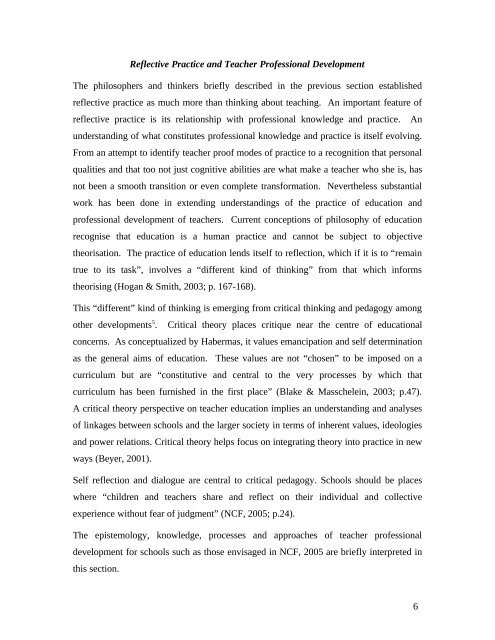Reflective Practice and Teacher Education - Azim Premji University
Reflective Practice and Teacher Education - Azim Premji University
Reflective Practice and Teacher Education - Azim Premji University
You also want an ePaper? Increase the reach of your titles
YUMPU automatically turns print PDFs into web optimized ePapers that Google loves.
<strong>Reflective</strong> <strong>Practice</strong> <strong>and</strong> <strong>Teacher</strong> Professional Development<br />
The philosophers <strong>and</strong> thinkers briefly described in the previous section established<br />
reflective practice as much more than thinking about teaching. An important feature of<br />
reflective practice is its relationship with professional knowledge <strong>and</strong> practice. An<br />
underst<strong>and</strong>ing of what constitutes professional knowledge <strong>and</strong> practice is itself evolving.<br />
From an attempt to identify teacher proof modes of practice to a recognition that personal<br />
qualities <strong>and</strong> that too not just cognitive abilities are what make a teacher who she is, has<br />
not been a smooth transition or even complete transformation. Nevertheless substantial<br />
work has been done in extending underst<strong>and</strong>ings of the practice of education <strong>and</strong><br />
professional development of teachers. Current conceptions of philosophy of education<br />
recognise that education is a human practice <strong>and</strong> cannot be subject to objective<br />
theorisation. The practice of education lends itself to reflection, which if it is to “remain<br />
true to its task”, involves a “different kind of thinking” from that which informs<br />
theorising (Hogan & Smith, 2003; p. 167-168).<br />
This “different” kind of thinking is emerging from critical thinking <strong>and</strong> pedagogy among<br />
other developments 5 . Critical theory places critique near the centre of educational<br />
concerns. As conceptualized by Habermas, it values emancipation <strong>and</strong> self determination<br />
as the general aims of education. These values are not “chosen” to be imposed on a<br />
curriculum but are “constitutive <strong>and</strong> central to the very processes by which that<br />
curriculum has been furnished in the first place” (Blake & Masschelein, 2003; p.47).<br />
A critical theory perspective on teacher education implies an underst<strong>and</strong>ing <strong>and</strong> analyses<br />
of linkages between schools <strong>and</strong> the larger society in terms of inherent values, ideologies<br />
<strong>and</strong> power relations. Critical theory helps focus on integrating theory into practice in new<br />
ways (Beyer, 2001).<br />
Self reflection <strong>and</strong> dialogue are central to critical pedagogy. Schools should be places<br />
where “children <strong>and</strong> teachers share <strong>and</strong> reflect on their individual <strong>and</strong> collective<br />
experience without fear of judgment” (NCF, 2005; p.24).<br />
The epistemology, knowledge, processes <strong>and</strong> approaches of teacher professional<br />
development for schools such as those envisaged in NCF, 2005 are briefly interpreted in<br />
this section.<br />
6


